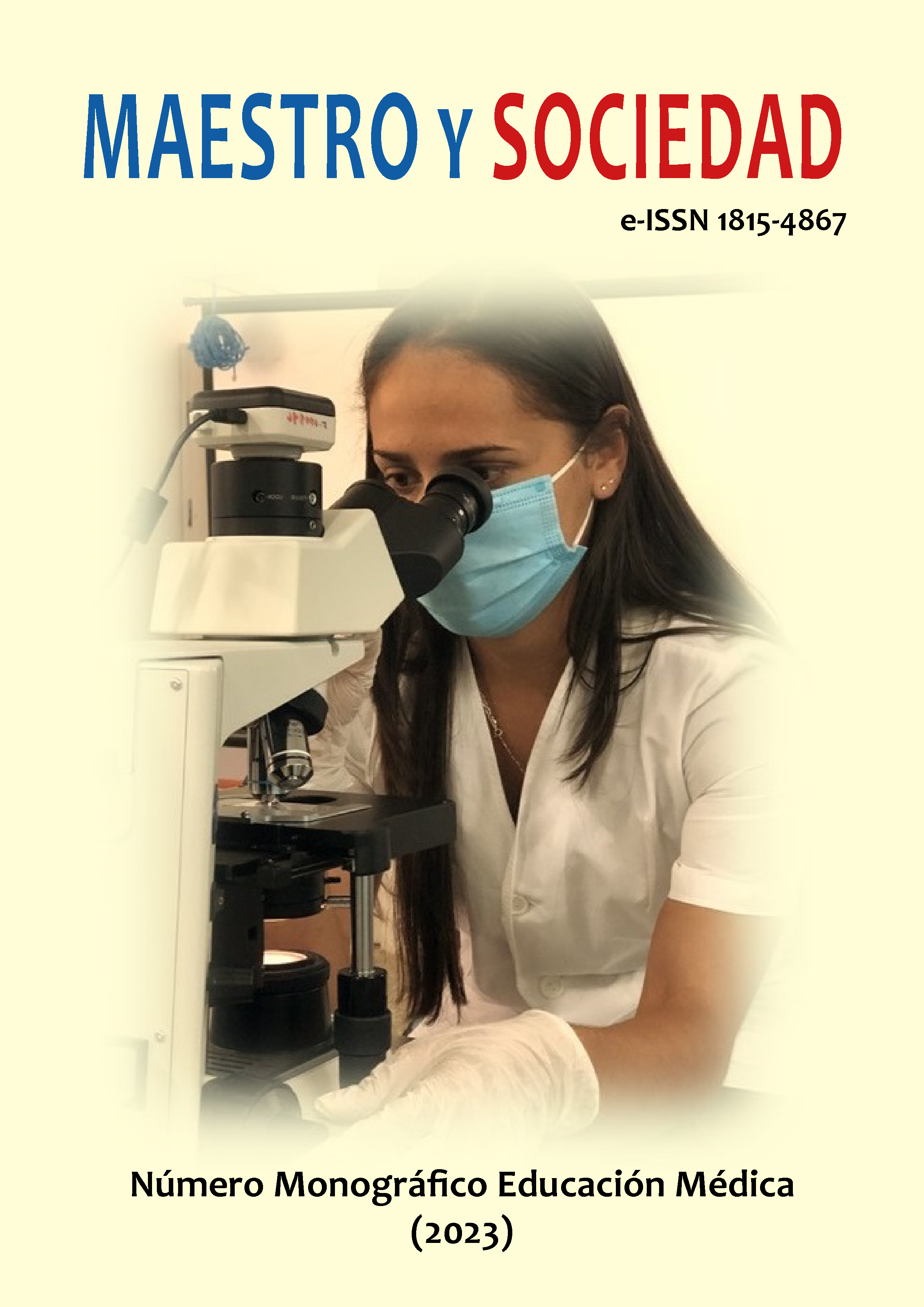Management of the formative impact of the results of the educational researches
Management of the formative impact of the results of the educational researches
Keywords:
management, formative impact, scientific results, educational researchAbstract
Introduction: The need to evaluate the impact is increasingly recognized in educational settings, since knowing the results is essential to make decisions regarding the relevance and applicability based on the problems detected. The purpose of the research was the elaboration of a management strategy for the formative impact of the results of educational research that contributes to continuous improvements in the educational context, improvement of educational quality and human development. Materials and methods: Theoretical level methods were used, supported by dialectical materialism: historical-logical, analysis-synthesis, systemic-structural-functional, holistic-dialectical; and empirical techniques, such as: surveys, interviews, observation and documentary analysis. Results: It was obtained that in the last three years models and strategies (100%) stood out, followed by methodologies (73.3%), methods and procedures (40.0%), and to a lesser extent, proposals for multimedia or technological products (20%), system of activities and exercises (13.3%), as well as study plans and programs (6.7%). Discussion: The scientific-educational results acquire great relevance in themselves since they become a scientific and critical reflection in the university training process, however, today it constitutes an unresolved problem due to the lack of systematicity on the part of researchers and managers to that the knowledge contributed and directed to amend the problems related to training, manage to be applied and originate the desired educational effect. Conclusions: It is concluded that the strategy for managing the formative impact of the results of educational research helped to systematize new ways that allow promoting the management of the formative impact, as well as demonstrated the need to use the scientific-educational results since they guarantee a transformation gradual in all the actors and the improvement of the educational quality. Keywords: management, formative impact, scientific results, educational research.
References
Alonso, Y. et al. (2016). La investigación pedagógica en el proceso de evaluación. Revista Educación Médica Superior, 30(3).
Arencibia, V. (2005). La investigación educativa desde un enfoque dialéctico. Congreso PEDAGOGÍA 2005.
Castells, M. et al. (1997). Nuevas perspectivas críticas en educación. Paidós.
Cohen, M. et al. (2010). Scientific impact: Opportunity and necessity. Western Journal of Nursing Research, 32(5), 578-590. http://wjn.sagepub.com/content/32/5/578.
Cortés, D. (2007). Medir la producción científica de los investigadores universitarios: la bibliometría y sus límites. Revista de la Educación Superior, XXXIV(2), 43-65.
Cruz, M. y Martínez, M. C. (2014). La evaluación del impacto social de la actividad de ciencia e innovación. Una mirada desde el contexto educacional. Cuadernos de Educación y Desarrollo, (48).
Díaz-Canel Bermúdez, M. (2019). Detalles de la entrevista de Patricia Villegas al presidente cubano Miguel Díaz-Canel Bermúdez. Periódico Granma.
Figueroa, Y. (2017). Metodología para la evaluación de la pertinencia e impacto científico de los resultados investigativos. [Tesis de maestría. Universidad de Oriente].
Fleites, L., Ramos, I., y Francisco, M. (2016). Instrumentos para la evaluación del impacto de la introducción de resultados científicos. Pedagogía y Sociedad, 19(45).
Hilarraza, J. (2009). Gestión formativa de la investigación pedagógica. [Tesis de doctorado. UCP].
Lissabet Rivero, J. L. & Rosabal Ferrer, T. C. (2022). La evaluación del impacto de la introducción y generalización de resultados de investigaciones pedagógicas. EduSol, 22(79), 16-31. http://scielo.sld.cu/scielo.php?script=sci_arttext&pid=S1729-80912022000200016&lng=es&tlng=es
López Falcón, A. (2021). Los tipos de resultados de investigación en las ciencias de la educación. Revista Conrado, 17(S3), 53-61. https://conrado.ucf.edu.cu/index.php/conrado/article/view/2137.
Ortiz, E. A. (2015). La evaluación del impacto científico en las investigaciones educativas a través de un estudio de caso. Revista Electrónica de Investigación Educativa, 17(2), 89-100. http://redie.uabc.mx/vol17no2/contenido-ortizt.html
Ramos, F., Meizoso, M., y Guerra, R. (2016). Instrumento para la evaluación del impacto de la formación académica. Universidad y Sociedad, 8(2), 114-124. https://bit.ly/38nSpU2
Saavedra, O., et al. (2005). El uso de los indicadores cualitativos y cuantitativos en la evaluación de las publicaciones periódicas: el caso del Centro de investigación y de Estudios Avanzados del Instituto Politécnico Nacional de México. Revista Española de Documentación Científica, 24, 4.
Salguero Rosero, J. R., & Pérez Barral, O. (2022). Aproximaciones teóricas y metodológicas para la gestión de la investigación formativa. Chakiñan, Revista de Ciencias Sociales y Humanidades, 217–235. https://doi.org/10.37135/chk.002.19.13
Tardo Fernández, Y. & Escalona Falcón, C. A. (2021). Evaluation of the training impact of educational research: a management proposal. Conrado, 17(79), 41-48. http://scielo.sld.cu/scielo.php?script=sci_arttext&pid=S1990-86442021000200041&lng=es&tlng=en.
Tardo Fernández, Y., Fernández Díaz, Y. y Derencelé Acosta, Á. (2019). Gestión para la evaluación del impacto formativo de las investigaciones educativas. Revista Inclusiones, 6(3), 46-62.
Downloads
Published
How to Cite
Issue
Section
License
Copyright (c) 2023 Yelena Fernández Díaz, Yunia Zamora Cuñat, Yasmina Guilbeaux Milhet, Maidilis Beltrán Moret

This work is licensed under a Creative Commons Attribution-NonCommercial-NoDerivatives 4.0 International License.
This journal provides immediate open access to its content, based on the principle that offering the public free access to research helps a greater global exchange of knowledge. Each author is responsible for the content of each of their articles.



























 Universidad de Oriente
Universidad de Oriente 